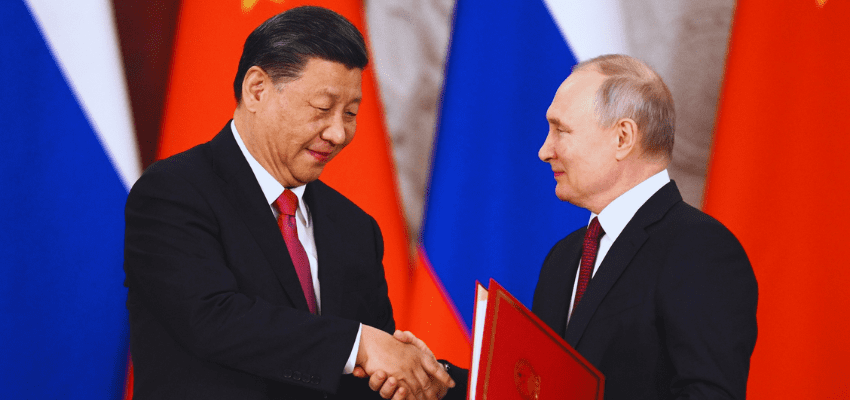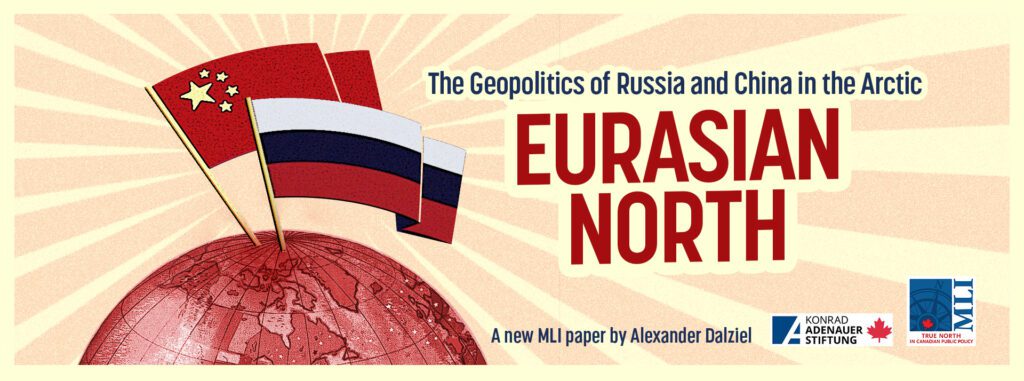This article originally appeared in the Japan Times.
By Stephen Nagy, July 12, 2024
Listening to Russian President Vladimir Putin’s speeches about what kind of international order Russia seeks brings us back to the concept of the Concert of Europe — a system in which certain countries enjoy spheres of influence.
This architecture allows some privileged nations to encourage, compel, cajole and coerce those within their sphere to make foreign and domestic policy choices in line with the dominant power’s preferences and priorities.
Since launching a full-scale invasion of Ukraine, Putin has discussed at length the importance of “indivisible security,” a concept that embodies the sphere of influence logic. According to the Kremlin, indivisible security means that one country’s security cannot come at the expense of another’s.
Unsurprisingly, China supports this concept as it sees the world similarly. For both Moscow and Beijing, having a sphere of influence is the cornerstone of security policy.
While Russia has more experience negotiating spheres of influence through its interactions with countries in Europe and South and Central Asia, including during Soviet times, China is different.
For centuries, succeeding Chinese dynasties interacted with their neighbors through different types of benefactor-beneficiary relationships. For example, Japan rejected a hierarchical relationship with China and distanced itself from the Tang Dynasty (618-907) onward. It instead chose to engage with the various Chinese dynasties in nuanced, moderated and selective ways.
In his book “China and Japan: Facing History,” the late Ezra Vogel outlines a situation in which monks, the odd trader and the odd visitor from Japan engaged in bilateral relations with China.
This changed in the modern era as Japanese officials started reengaging with China to modernize and Westernize Japan based on the mantra of wakon yōsai, “Japanese spirit and Western knowledge.”
The Korean peninsula was different. With de facto suzerainty over it, the dynasties of Ming (1368-1644) and Qing (1644-1912) oversaw Korea’s foreign policy in exchange for trade, gifts, knowledge and technology — a “friends with benefits” relationship, so to speak.
Southeast Asian kingdoms corresponding to today’s Vietnam, Laos, Cambodia and others had different kinds of relationships with Chinese dynasties. Bill Hayton, author of “The Invention of China,” and Howard French, who wrote “Everything Under the Heavens: How the Past Helps Shape China’s Push for Global Power,” both demonstrate that dynastic China’s sphere of influence was superficial at best, and delusional at worst.
As we compare China’s and Russia’s common interest in indivisible security and spheres of influence, we should note that they have different experiences and notions of these concepts.
What is key to both is that Beijing’s and Moscow’s neighbors should defer to their respective wishes at the domestic, regional and international level. In practice, this means that countries under their influence should consider China’s or Russia’s interests before their relationship with — potentially like-minded — states such as the United States.
Russia and China couch indivisible security as the pursuit of a just and equal international order in which everyone’s security is prioritized, juxtaposing it against a false narrative of U.S. global hegemony, Western hypocrisy and an international order that they did not contribute to building.
This is ironic. As Rana Mitter writes in “Forgotten Ally: China’s World War II, 1937-1945,” the Chinese Communist Party has been proactively rewriting history, placing China at the genesis of the current international order for its key role in defeating Japanese and global fascism.
Russia’s contradictions are also on full display. In the Yalta Agreement of 1945, U.S. President Franklin D. Roosevelt, British Prime Minister Winston Churchill and Soviet leader Josef Stalin made consequential decisions about the postwar global order. This illustrates that the Soviet Union was very much at the decision-making table — and not on the menu.
Russian and Chinese hypocrisy derives more from the threat of domestic insecurity and wanting more influence over how international decisions are made.
The current rule-based international order is one that both the Chinese and Russians helped shape. They both imposed sanctions on terrorist groups after 9/11, contributed to the Paris Climate Agreement and helped shape the World Trade Organization’s evolution and governance as well as the United Nations’ agenda and development in certain areas.
Rather than being excluded from global decision-making, they have been key stakeholders of it.
Pivoting back to the idea of indivisible security and its contradictions, we should be clear that if you are Japanese, Korean or Southeast Asian, China would expect you to distance yourself from military and security ties with the U.S. as such a relationship threatens Chinese security. Beijing may also make demands to crack down on press and academic freedom and civil society because these, too, threaten the authoritarian state.
In a way, all these countries would become Hong Kong. They would have a functioning economy, but hollow civil societies, no press freedom and their leaders would be handpicked by Beijing. This is indivisible security with Chinese characteristics for a new era under leader Xi Jinping.
Similarly, in Europe and possibly South and Central Asia, states bordering Russia would be compelled to withdraw NATO troops from their borders. Exercises within NATO would have to align with Moscow’s security priorities and civil society and media criticizing Moscow would be curtailed. For Russia, indivisible security means that neighbors and neighbors’ neighbors defer to its security needs.
The problem with this logic is that spheres of influence do not have real borders. They are nebulous, with no start and no end.
Russia and China’s prescription for a new international order is flawed and demonstrates that these authoritarian states are not interested in justice and equality, nor in indivisible security for all.
Quite the contrary. They want indivisible security for themselves based on hierarchical relationships. They want an international order that ensures the integrity of their political systems, which would be forever shielded from transparency, the rule of law and democracy.
Stephen R. Nagy is a professor at the department of politics and international studies at the International Christian University and a senior fellow at the MacDonald Laurier Institute.







